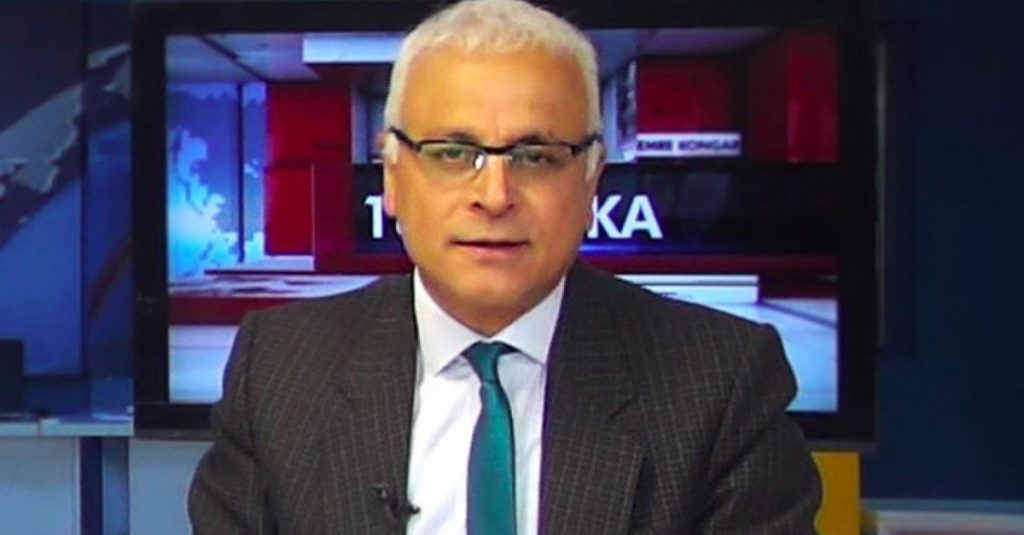Journalist Merdan Yanardağ, editor-in-chief of the Tele 1 TV station, was detained after criticizing the “isolation” imposed on the outlawed Kurdistan Workers’ Party’s (PKK) jailed leader, Abdullah Öcalan, saying it should be lifted, local media reported on Monday.
The “isolation” of Öcalan, who has been jailed in a high-security prison on İmralı Island in the Sea of Marmara since 1999, refers to his inability to speak with his lawyers for years.
Yanardağ was detained on Monday as part of an investigation launched into him by the İstanbul Chief Public Prosecutor’s Office for his statements regarding Öcalan’s isolation during a program on Tele 1 over the weekend.
“The isolation imposed on Abdullah Öcalan has no place in the law. It should be lifted. He is unable to even meet with his family [members] and lawyer. … Öcalan is an extremely intelligent person who reads a lot of books and correctly understands … politics,” the journalist said.
The investigation was launched after Mehmet Ali Çelebi, a lawmaker from the ruling Justice and Development Party (AKP), pointed to Yanardağ as a target by sharing a video on social media that was a compilation of what the journalist said in the program.
TELE1 Yayın Yönetmeni Merdan Yanardağ’dan Bebek Katiline övgüler…
-Öcalan Türkiye’de en uzun süre yatan siyasi mahkum…
-Abdullah Öcalan'a uygulanan tecritin hukukta hiçbir yeri yoktur…
-Abdullah Öcalan; çok kitap okuyan, son derece zeki bir kişidir. Cezaevinde filozof oldu…… pic.twitter.com/aEaHuRcKuT— Mehmet Ali Çelebi (@celebimehmeta) June 25, 2023
Yanardağ was taken into custody by the counterterrorism police at the Tele 1 headquarters in Istanbul on charges of “praising crime and criminals” and “disseminating propaganda for a terrorist organization.”
Meanwhile, Radio and Television Supreme Council (RTÜK) Chairman Ebubekir Şahin announced on Twitter on Sunday that the council had launched an investigation into Tele 1 due to Yanardağ’s statements which Şahin said was praising “the terrorist leader who is responsible for the killings of thousands of people.”
Binlerce kişinin katili terörist başını öven Merdan Yanardağ denilen şahsın açıklamaları üzerine Tele 1 hakkında gerekli inceleme başlatılmıştır. Kamuoyuna saygıyla duyurulur. pic.twitter.com/aEmr5OWg6I
— Ebubekir Şahin (@ebekirsahin) June 25, 2023
Öcalan, who was given a life sentence for treason after Turkey removed the death penalty, has been barred from meeting with his legal representatives since 2011 with one exception and has had only limited family visits since the collapse of the settlement process in 2015.
The settlement process, which refers to talks between the AKP government and the leadership of the PKK to resolve the Kurdish issue, began in 2012 and ended after two police officers were executed in southeastern Şanlıurfa province in June 2015.
It is common for journalists in Turkey, which has a poor record on freedom of the press, to face threats, physical attacks and legal harassment due to their work.
Rights groups routinely accuse the Turkish government of trying to keep the press under control by imprisoning journalists, eliminating media outlets, overseeing the purchase of media brands by pro-government conglomerates and using regulatory authorities to exert financial pressure, especially since President Recep Tayyip Erdoğan survived a failed coup in July 2016.
Turkey is ranked 165th in the Reporters Without Borders (RSF) 2023 World Press Freedom Index, among 180 countries, not far from North Korea, which occupies the bottom of the list.

